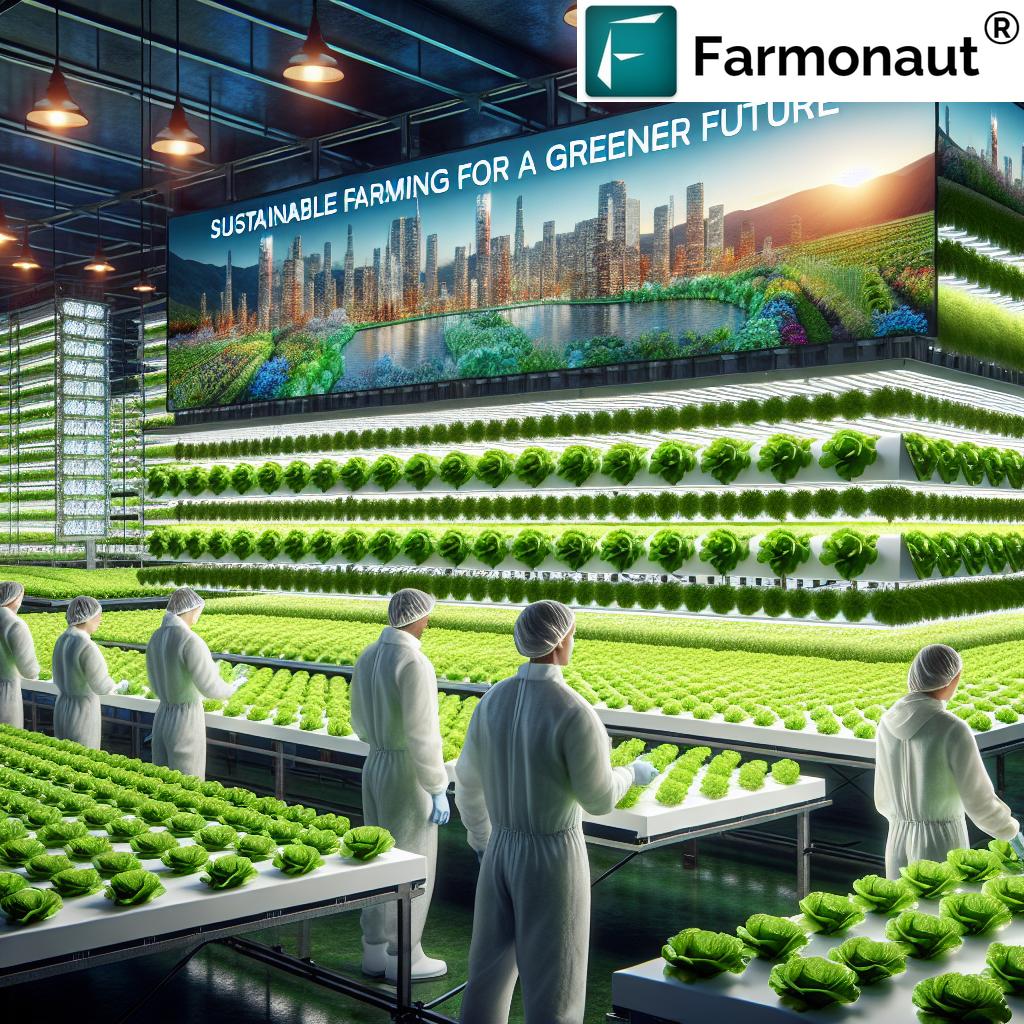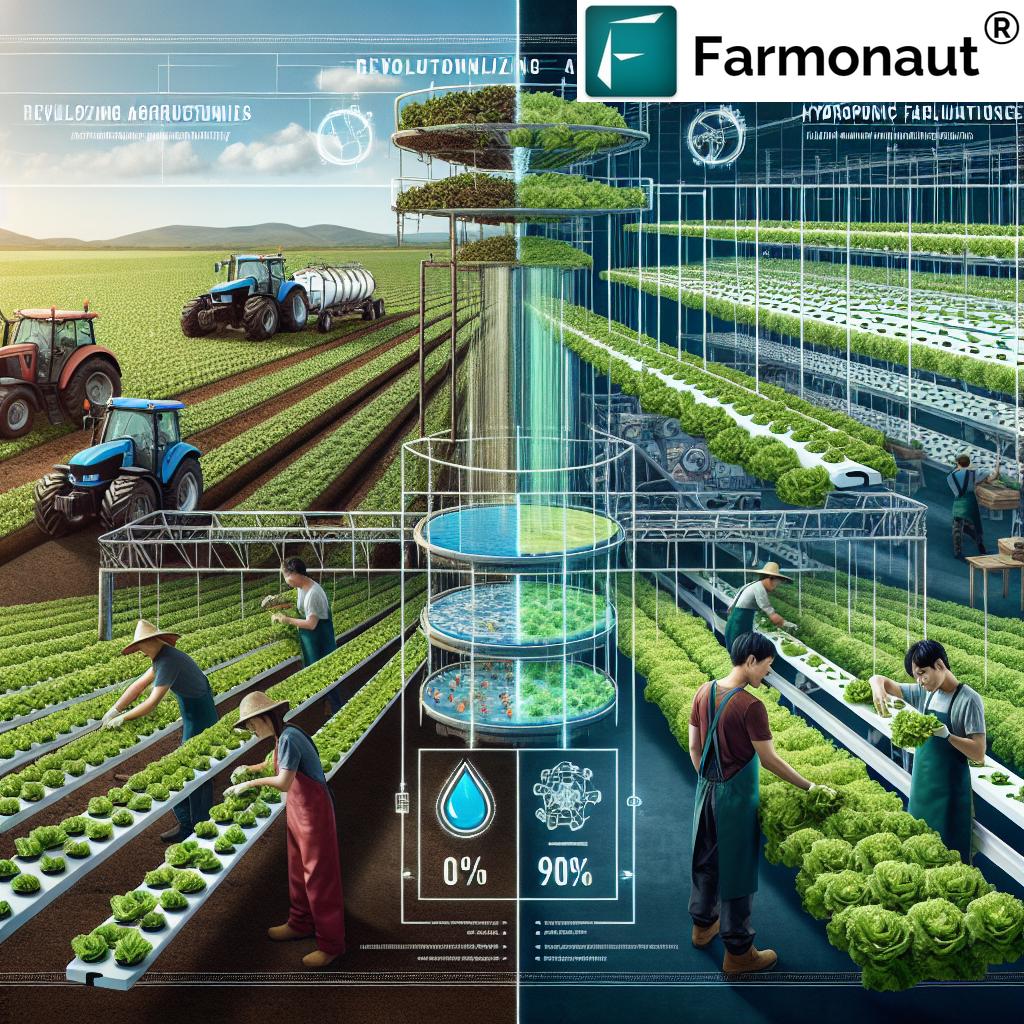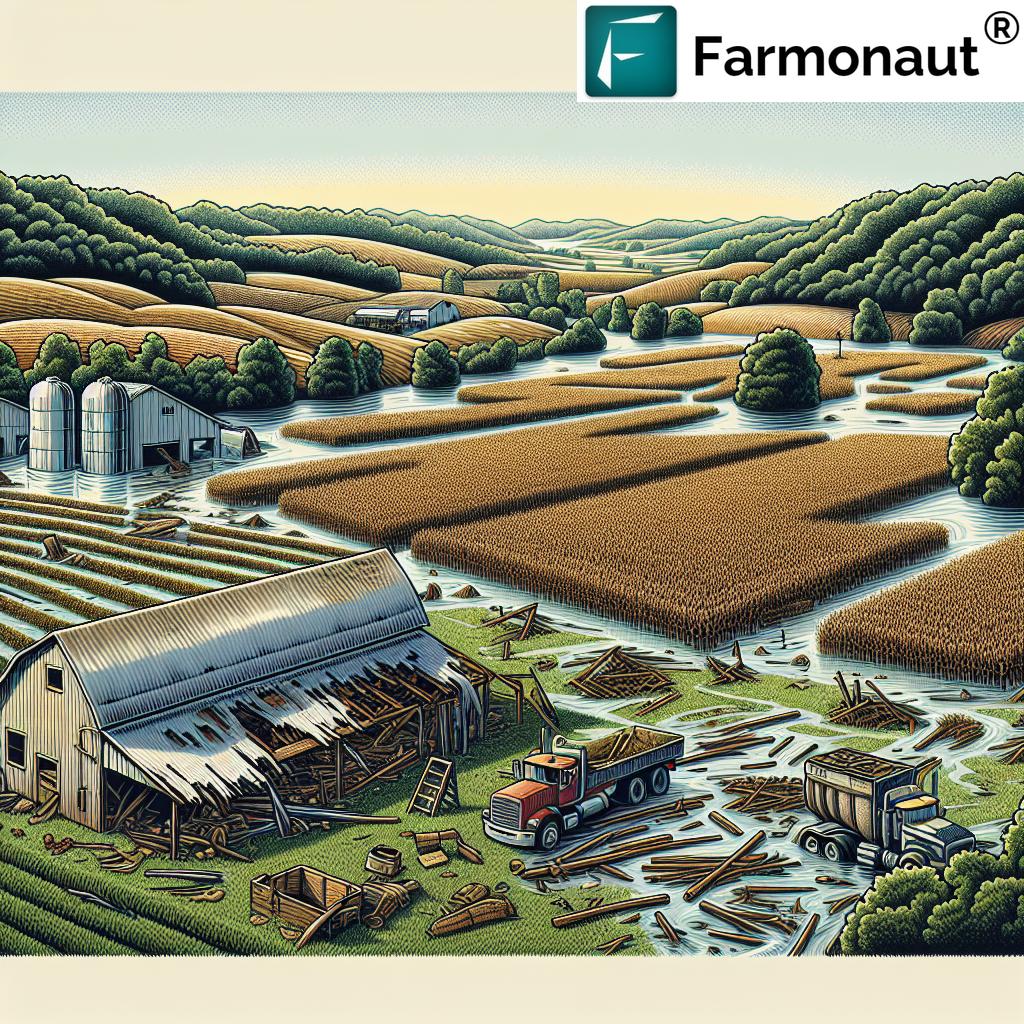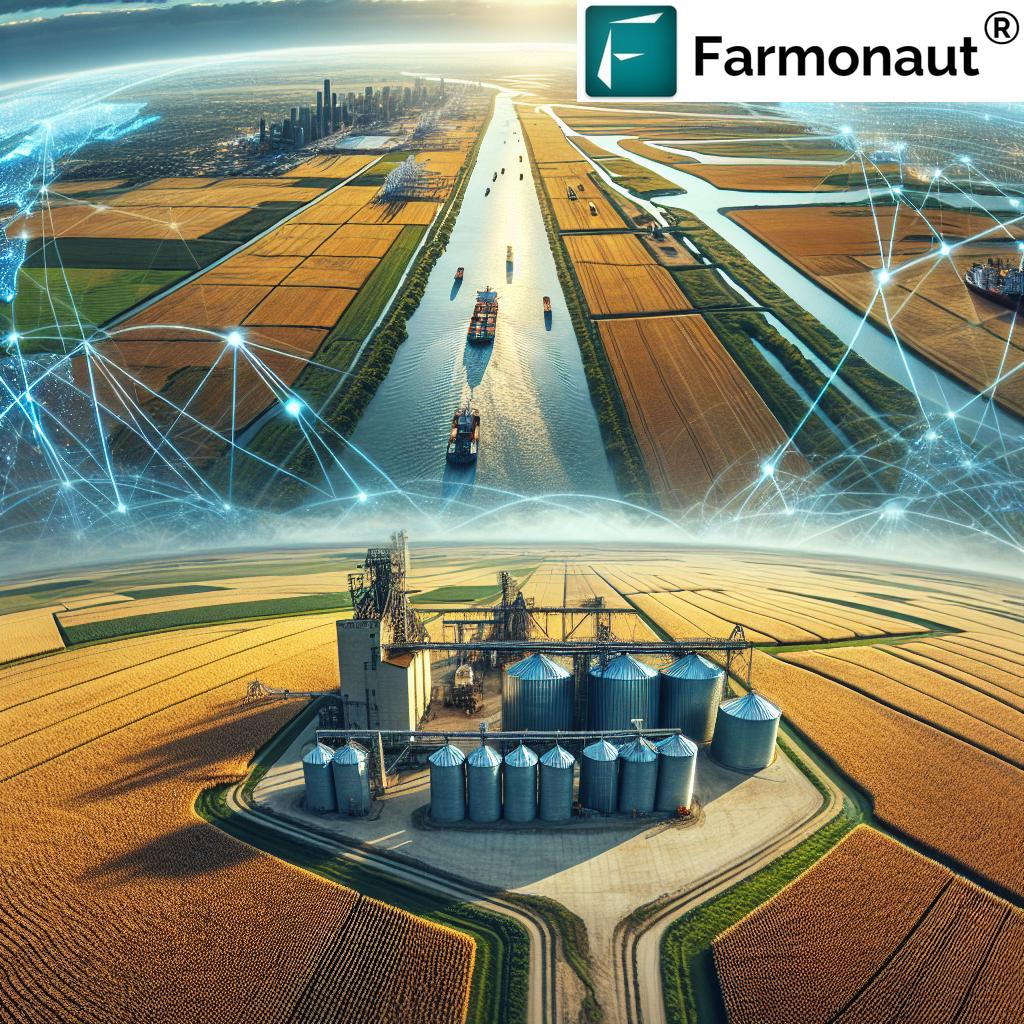Sustainable Agriculture Boom: Michigan Nonprofit Acquires Hydroponic Lettuce Farm, Expanding Job Opportunities
“Michigan’s hydroponic lettuce farm produces 1.5 million pounds of salad greens annually, supplying local grocery chains and restaurants.”
In a groundbreaking move that’s set to revolutionize sustainable agriculture jobs and hydroponic farming, we’re excited to share news of a recent acquisition in Michigan that’s making waves in the agricultural industry. This innovative development not only promotes job opportunities in agriculture but also supports employment for people with barriers, combining a commitment to community, high-quality products, and environmental sustainability.
At Farmonaut, we’re always keen to highlight advancements in sustainable farming practices, and this merger is a prime example of how innovative farming techniques can meet social responsibility, creating a more inclusive and eco-friendly food production system. Let’s delve into the details of this exciting venture and explore its implications for the future of agriculture.
The Acquisition: A New Chapter in Sustainable Farming
Peckham, a vocational rehabilitation nonprofit based in Michigan, has recently expanded its agriculture business by acquiring Revolution Farms, a state-of-the-art hydroponic indoor lettuce farm located in Caledonia, Kent County, MI. This 3.5-acre facility is at the forefront of sustainable farming methods, utilizing cutting-edge hydroponic techniques to produce an impressive 1.5 million pounds of salad greens annually.

While the purchase price remains undisclosed, the acquisition brings approximately 30 Revolution Farms employees into the Peckham family, further expanding the organization’s workforce and impact. This move aligns perfectly with Peckham’s mission of providing vocational training for disabilities and creating meaningful employment opportunities for individuals facing barriers to work.
Revolution Farms: A Leader in Hydroponic Farming
Founded in 2018, Revolution Farms has quickly established itself as a pioneer in the field of hydroponic farming. The company’s innovative approach to agriculture has allowed it to become a major supplier of fresh produce to grocery chains, restaurants, and hospitality groups throughout the Midwest region.
What sets Revolution Farms apart is its commitment to sustainable farming methods. The hydroponic farm boasts impressive statistics that highlight its efficiency and eco-friendliness:
- 90% reduction in water usage compared to traditional farming methods
- 90% less land required for equivalent crop yields
- 95% reduction in transportation miles, ensuring maximum freshness for consumers
These figures underscore the potential of hydroponic farming to address some of the most pressing challenges facing modern agriculture, including resource conservation and reducing carbon footprints.
Peckham: Empowering Through Employment
Peckham is no stranger to innovative business ventures. The organization operates a diverse portfolio of enterprises, including:
- A 2.5-acre produce farm in Lansing, growing fruits, vegetables, herbs, and flowers
- Federal call centers in Grand Rapids
- Three military apparel manufacturing facilities in Michigan
- Additional business lines in Phoenix, Arizona, and London, Kentucky
What sets Peckham apart is its unwavering commitment to providing paid job training and employment opportunities for people with disabilities and other barriers to employment. These barriers may include criminal backgrounds, minimal education, or limited work experience.
The organization’s impact is significant. In the last fiscal year alone, Peckham:
- Served over 7,500 individuals through its programs
- Paid more than $104 million in wages
By acquiring Revolution Farms, Peckham is not only expanding its agricultural footprint but also creating new avenues for sustainable agriculture jobs and vocational training for disabilities.
The Synergy: Combining Social Mission with Sustainable Agriculture
The merger of Peckham and Revolution Farms represents a unique partnership that brings together social responsibility and cutting-edge agricultural practices. This combination has the potential to create a powerful impact on both the community and the environment.
“The sustainable farming methods used in this hydroponic facility reduce water and land usage by 90% compared to traditional farming.”
Jo Sperry, Peckham’s Chief Executive and Inclusion Officer, emphasized the shared values that make this acquisition so promising: “Peckham and Revolution Farms share a commitment to people, community, and providing high-quality products and services to customers. We are excited to add this reputable and respectable brand to our social enterprises, and to continue to innovate in one of Michigan’s leading industries.”
This sentiment was echoed by John Green, CEO of Revolution Farms, who stated, “This is an exciting new chapter for Revolution Farms. Having Peckham on board means continued growth and opportunity — not only for the farm and its customers but for our dedicated employees who are the heart of what we do.”
The Impact: Job Opportunities and Sustainable Growth
The acquisition of Revolution Farms by Peckham is set to have a multifaceted impact on the local community and the broader agricultural sector:
- Expanded Job Opportunities: The merger will create new sustainable agriculture jobs, particularly for individuals with disabilities or other barriers to employment.
- Skills Development: Peckham’s vocational training programs will now extend to hydroponic farming, offering participants valuable skills in a growing industry.
- Sustainable Food Production: The expansion of Revolution Farms’ operations will increase the supply of locally-grown, sustainable produce in the Midwest.
- Environmental Benefits: The continued use and potential expansion of hydroponic farming methods will contribute to water and land conservation efforts.
- Economic Growth: The success of this venture could attract more investment in sustainable agriculture in Michigan and beyond.

The Future of Agriculture: Hydroponic Farming and Sustainability
The acquisition of Revolution Farms by Peckham is more than just a business transaction; it’s a glimpse into the future of agriculture. Hydroponic farming, with its numerous benefits, is poised to play a crucial role in addressing global food security challenges while minimizing environmental impact.
Let’s take a closer look at how hydroponic farming compares to traditional agriculture:
| Aspect | Traditional Farming | Hydroponic Farming |
|---|---|---|
| Water Usage | High water consumption | 90% reduction in water usage |
| Land Usage | Requires large land areas | 90% reduction in land usage |
| Annual Yield (estimated for equivalent land area) | Lower yield per acre | Significantly higher yield per acre |
| Transportation Distance | Often long distances to market | 95% reduction in transportation miles |
| Job Opportunities | Seasonal employment common | Year-round employment opportunities |
| Environmental Impact | Higher pesticide use, soil erosion risks | Reduced pesticide use, no soil erosion |
As we can see, hydroponic farming offers significant advantages in terms of resource efficiency and environmental impact. These benefits make it an attractive option for sustainable agriculture, particularly in urban and peri-urban areas where land is at a premium.
The Role of Technology in Modern Agriculture
While hydroponic farming is at the forefront of sustainable agriculture, it’s just one piece of the puzzle. At Farmonaut, we believe that technology has a crucial role to play in shaping the future of farming. Our satellite-based farm management solutions are designed to complement and enhance both traditional and innovative farming methods.
Here’s how our technology can support sustainable agriculture initiatives like the Peckham-Revolution Farms venture:
- Crop Health Monitoring: Our satellite imagery technology can provide real-time insights into crop health, even in indoor hydroponic settings.
- Resource Management: Our AI-driven tools can help optimize water and nutrient usage in hydroponic systems, further enhancing their efficiency.
- Supply Chain Transparency: Our blockchain-based traceability solutions can help track produce from farm to consumer, enhancing trust and reducing waste.
- Carbon Footprint Tracking: Our carbon footprinting tools can help quantify the environmental benefits of hydroponic farming compared to traditional methods.
By leveraging these technologies, farms like Revolution Farms can further optimize their operations, maximize yields, and demonstrate their commitment to sustainability.
The Broader Impact: Reshaping the Agricultural Landscape
The Peckham-Revolution Farms acquisition is more than just a local success story; it’s a model that could be replicated across the country and beyond. This unique partnership demonstrates how innovative farming practices can be combined with social responsibility to create a more inclusive and sustainable food production system.
Here are some of the ways this model could reshape the agricultural landscape:
- Increased Urban Agriculture: Hydroponic farms like Revolution Farms can thrive in urban and suburban areas, bringing food production closer to consumers and reducing transportation costs.
- Year-Round Employment: Unlike traditional farming, which often relies on seasonal labor, hydroponic farms can provide stable, year-round employment opportunities.
- Skills Development: As more farms adopt hydroponic and other high-tech farming methods, there will be an increased demand for workers with specialized skills in these areas.
- Food Security: By producing high yields in small spaces, hydroponic farms can contribute to local food security, even in areas with limited arable land.
- Environmental Conservation: The reduced water and land usage of hydroponic farms can help conserve natural resources and minimize agriculture’s environmental footprint.
At Farmonaut, we’re excited to see how initiatives like this will continue to drive innovation in the agricultural sector. Our mission to make precision agriculture affordable and accessible aligns perfectly with the goals of sustainable, socially responsible farming ventures.
The Road Ahead: Challenges and Opportunities
While the acquisition of Revolution Farms by Peckham represents a significant step forward for sustainable agriculture and inclusive employment, it’s important to acknowledge that challenges remain. As we look to the future, here are some key areas that will require ongoing attention and innovation:
- Scaling Up: As demand for sustainably grown produce increases, hydroponic farms will need to find ways to scale up their operations while maintaining efficiency and quality.
- Energy Usage: While hydroponic farms use less water and land, they can be energy-intensive. Finding ways to reduce energy consumption or incorporate renewable energy sources will be crucial.
- Crop Diversity: Currently, hydroponic farms excel at producing leafy greens and herbs. Expanding the range of crops that can be grown hydroponically will be important for long-term sustainability.
- Public Education: Many consumers are still unfamiliar with hydroponic farming. Educating the public about the benefits of this method will be essential for building trust and demand.
- Policy Support: Advocating for policies that support sustainable agriculture and inclusive employment practices will be crucial for the growth of initiatives like the Peckham-Revolution Farms partnership.
Despite these challenges, the opportunities presented by this model are immense. By combining sustainable farming practices with social responsibility, we have the potential to create a more resilient, equitable, and environmentally friendly food system.
How Farmonaut Supports Sustainable Agriculture
At Farmonaut, we’re committed to supporting sustainable agriculture initiatives like the Peckham-Revolution Farms venture. Our suite of tools and technologies can help farms of all types optimize their operations and improve their sustainability metrics. Here’s how:
- Satellite-Based Crop Monitoring: Our advanced satellite imagery technology provides real-time insights into crop health, helping farmers make informed decisions about irrigation, fertilization, and pest management.
- AI-Powered Advisory System: Our Jeevn AI system delivers personalized farming advice based on real-time data, helping farmers optimize their practices for maximum yield and sustainability.
- Blockchain-Based Traceability: Our traceability solutions help farms demonstrate their commitment to sustainability and build trust with consumers.
- Resource Management Tools: Our platform includes tools for efficient fleet and resource management, helping farms reduce waste and optimize their operations.
- Carbon Footprint Tracking: Our carbon footprinting features allow farms to monitor and reduce their environmental impact, supporting their sustainability goals.
We invite farmers, agribusinesses, and organizations involved in sustainable agriculture to explore our solutions and see how they can support their operations.
Conclusion: A New Era for Sustainable Agriculture
The acquisition of Revolution Farms by Peckham marks a significant milestone in the journey towards more sustainable and inclusive agricultural practices. This partnership demonstrates how innovative farming techniques, social responsibility, and cutting-edge technology can come together to create a more resilient and equitable food system.
As we look to the future, it’s clear that initiatives like this will play a crucial role in addressing the global challenges of food security, environmental sustainability, and inclusive employment. At Farmonaut, we’re excited to be part of this revolution, providing the tools and technologies that will help drive the next generation of sustainable agriculture.
Whether you’re a farmer looking to optimize your operations, an agribusiness seeking to improve your sustainability metrics, or an organization committed to creating inclusive employment opportunities, we invite you to join us in this exciting journey towards a more sustainable and equitable agricultural future.
FAQ Section
Q: What is hydroponic farming?
A: Hydroponic farming is a method of growing plants without soil, using nutrient-rich water solutions instead. This technique allows for efficient use of water and space, making it particularly suitable for urban environments.
Q: How does hydroponic farming compare to traditional farming in terms of sustainability?
A: Hydroponic farming typically uses 90% less water and land compared to traditional farming methods. It also reduces transportation distances, as farms can be located closer to urban centers.
Q: What types of crops can be grown hydroponically?
A: While hydroponic farming is particularly well-suited for leafy greens and herbs, a wide variety of crops can be grown using this method, including tomatoes, peppers, cucumbers, and even some fruits.
Q: How does the Peckham-Revolution Farms acquisition support job creation?
A: This acquisition combines Peckham’s focus on providing employment opportunities for people with disabilities or other barriers with Revolution Farms’ innovative hydroponic farming techniques. This creates new sustainable agriculture jobs and training opportunities in a growing sector.
Q: How can technology support sustainable agriculture initiatives like this?
A: Technologies like Farmonaut’s satellite-based farm management solutions can help optimize resource use, monitor crop health, and improve overall farm efficiency. This supports sustainable practices and helps farms maximize their yields while minimizing environmental impact.
Earn With Farmonaut
Earn 20% recurring commission with Farmonaut’s affiliate program by sharing your promo code and helping farmers save 10%. Onboard 10 Elite farmers monthly to earn a minimum of $148,000 annually—start now and grow your income!
Farmonaut Subscriptions
For more information about our API and developer documentation, please visit our API page and API Developer Docs.













